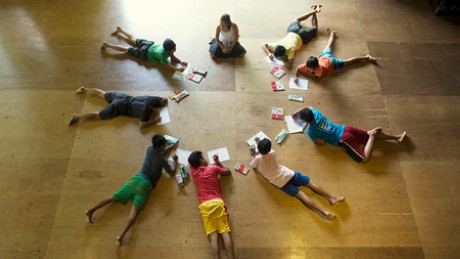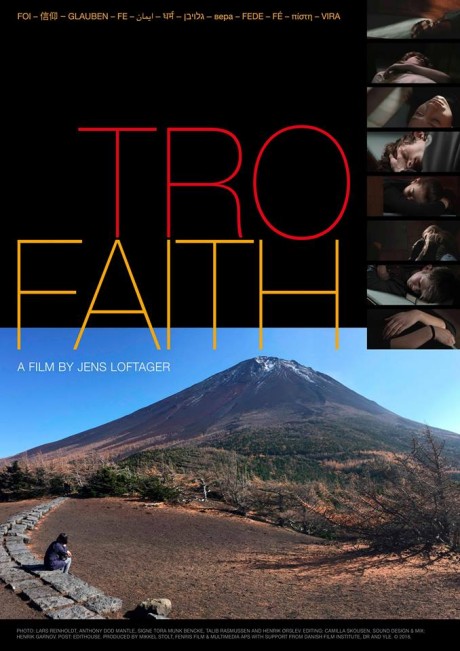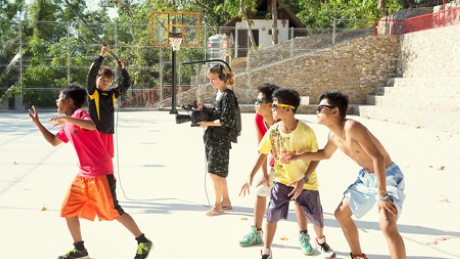MIKALA KROGH: A YEAR OF HOPE
“A year with 20 children and youths from Manila, who must find a path back into life after a harsh existence on the streets of the Philippine megalopolis, is it possible to change the lives of abused street children and give them hope for the future?
The Stairway programme makes an attempt in the Philippine capital, Manila, where they give twenty vulnerable street children one year away from the slum. One year in the name of hope – and one year with a bed to sleep in, proper food and a schooling process that aims to bring them back to life after the severe sexual assaults they have all endured and reacted to very differently. 13-year-old Justin’s greatest wish is to become a true ladyboy, and 15-year-old Pablo has forgotten how to smile after witnessing his family being killed.
Mikala Krogh is there during the whole year in her latest film, which gives images and voices to the most vulnerable youths in a society where every third child is sexually abused, and where thousands of children live alone on the streets. A both gripping, politically urgent and cinematically refined film about how you can actually make a difference for some of them.” (CPH-DOX programme)
KOMMENTAR
Mikala Krogh er på dette still med sit kamera på det daglige arbejde blandt sine medvirkende, de 20 gadedrenge fra Manila på et års rehabilitering og deres lærere på Stairway skolen langt væk fra storbyen på en stille ø syd for. Hun er i gang med gennem et år på dette sted at fotografere sine skildringer af begivenheder, som bredt illustrerer skolens arrangementer, et af filmens enkle og klart definerede lag. Her er drengene vist i gang med et keglespil mellem dagens undervisnings lektioner og samtaleterapi møder, hvor kameraet er med mange gange. Det er som hos etnografernes og socialantropologerne et feltarbejde med deltagerobservation og Mikala Krogh solidariserer sig ved at leve med sin familie på stedet så drengene må opleve et forbillede, en fungerende far, mor og børn familie.
“With A Year of Hope, I could tell that, if I wanted to do this story, I would have to be in the Philippines for a full year. I couldn’t just pop over once in a while. So, my husband and I and our three children moved to the island where the Stairways centre is,” says Krogh, who settled with her family in a village near the centre. “For me, being present is key. I have to be there at the right time, when something happens. That also means that I spent a lot of time being around when nothing was happening. I was just someone who was there filming…”(Dorthe Hygum Sørensen, interview, DFI)
Men tyngden er nok scener som dem, der introduceres i titelsekvensen, den indtrængende skildring af to af drengene Justin og Pablo, som også er et motivlag, en stadig modstilling af deres forskellige udvikling gennem filmens år med håb om rehabilitering, et lille aldrig smilende menneske, et dybt frustreret og af brutale tab traumatiseret familiemenneske, det er Pablo, og ved siden af ham en aldeles utilpasset og vanskeligt tilpasselig, kritisk udadvendt bohemenatur, det er Justin, aldrig selv i tvivl om, at han er smuk. Begge kommer de fra livet på gaden, flygtet fra hjemmets slum til nye krænkelser af deres tænkning, krop og seksualitet. Det er rystende og gribende, men smukt og ømt fortalte historier i fuldbårne filmscener, forbilledligt fotograferede, lyttede og klippede scener.
Mikala Krogh har sat sig for, at hendes film skal være enkel og til at overse. Der er altså disse to gennemgående fortællelinjer, reportageskildringer af begivenheder, fester og konflikter i årets løb og interviews, eller nok rigtigere terapeutiske samtaler i årets løb, følsomt og hensynsfuldt og tæt filmet af kameraet, som hele tiden er den tavse, usynlige, tredje deltager. Dertil kommer et lag af drømmeagtige udblik til gadelivet, nattelivet dengang og samtidig understøttet så fint og effektivt af Kristian Eidness Selin Andersens og Anders Trentemøllers medberettende score. Disse optagelser, som Mikala Krogh har ladet gadedrenge, som hun har udstyret med små kameraer optage på egen hånd på disse locations, hun umuligt selv kunne komme i, slet ikke om natten med kamera.
Imidlertid har hun om dagen kunnet følge socialarbejdere og lærere fra Stairway centret til besøg der og i boligkvartererne og hjemmene, det bliver et lag af scener, som føjer afgørende indblik til min forståelse af drengenes forfærdende opvækstbetingelser. Blide, hensynsfulde, empatiske reportagescener, hvor blikket taktfuldt sænkes, når jeg har set nok.
Ja, blikket er i de skildredes, i de medvirkendes vinkling overalt, på badeturen til havet, på skolens sportsplads, i undervisningslokalet, på sovesalen, i samtaleværelset. Og vigtigt: sådan også på politiskolen, hvor Mikala Krogh muntert opmærksom filmer politikadetter til foredrag om og øvelser i at benævne kropsdele ved deres præcist, værdifrie, anatomiske betegnelser og ord hentet i lægeverdenen. Dette sprog uden ydmygende, undertrykkende og sexistisk medbetydning skal de nemlig bruge, når de som færdiguddannede politifolk møder drengene på gaden i vanskelige situationer.
Mikala Kroghs kyndige kritik, hendes vurderende blik er her og overalt i hendes værk den venlige, loyale holdning. Hun er ikke neutral, men hun vil, tror jeg, kun iagttage og se og forstå. Der er her ikke forklarende interviews eller samtaler med centerledelse eller medarbejdere, hendes blik bliver konstant i drengenes (og i politikadetternes) niveau, øjenhøjde og vinkel. Hun fastholder med sin film uden kameraets rysten, uden egen tvivl, men iboende vedholdende håbet: det kan lykkes, men det gør det ikke med det samme og hver gang, heller ikke i filmen for alle drengenes vedkommende. Men så er det forfra endnu en gang, for det kan lykkes ved at opføre sig ordentligt, ved at træne, ved at lære, ved at blive ved. A Year of Hope er en omhyggelig, klog og aldeles usentimental og filmkunstnerisk meget vellykket film. Ja, en dejlig film. Tankevækkende og så er den simpelthen så ordentlig…

Danmark 2017, 83 min. Manuskript og instruktion: Mikala Krogh. Fotografi: Morgan Knibbe og Mikala Krogh. Musik: Kristian Eidness Selin Andersen og Anders Trentemøller. Klip: Cathrine Ambus. Production: Sigrid Jonsson Dyekjær for Danish Documentary Production. Dansk premiere på CPH:DOX : https://cphdox.dk/program/film/?id=455
LINKS
http://www.dfi.dk/Service/English/News-and-publications/News/ (om A Year of Hope)
http://www.dfi.dk/faktaomfilm/person/en/108420.aspx?id=108420 (om Mikala Krogh)
http://www.filmkommentaren.dk/blog/blogpost/336/ (TSM anmeldelse af Mikala Krogh: Everything is Relative)
http://www.filmkommentaren.dk/blog/blogpost/3250/ (ABN anmeldelse af Mikala Krogh: Ekstra Bladet uden for citat)
NOTATER
”Mikala Krogh’s new film A Year of Hope, homeless children in Manila, I have seen it, it is brilliant.” (Tue Steen Müller fra IDFA 2017)
”You won’t want to watch this story about life on the streets of Manila, but you should. It’s shocking to hear young Tracy and Joshua talk about being drugged and sexually abused, about how they have to steal their clothes from clotheslines. Alternatively, we also see them surrounded by love, food and nurturing during their year with the Stairway Foundation in the rural Philippines. While there, they learn that their genitals are theirs and theirs alone. Meanwhile, we see police cadets being taught in the same open way about penises and vaginas. These future officers are obviously more uncomfortable about these discussions than the street children they will someday work to protect. As the children’s conversations are cut with grainy shots of the streets of Manila, the contrast is obvious between the dark city and the sunny coast where children can be children again. But life on the street is always lurking in the background.” (IDFA programme, 2017)
”Some additional good news about the film programme in Riga. The Danish film about the newspaper Ekstra Bladet, The Newsroom – Off the Record , directed by Mikala Krogh, is not only screened as the opening film on September 2 in connection with the Baltic Sea Docs workshop and pitching forum, it is also the starting point for a discussion of the situation for a daily printed newspaper in a changing media landscape, in Denmark and Latvia. The producer of the film, Sigrid Dyekjær, and the chief-editor of the newspaper, Poul Madsen will visit Riga to take part in the discussion. The film comes to Riga awarded as the Best Documentary yesterday at the yearly TV-Festival in Copenhagen.”(Tue Steen Müller fra Riga 2015)
”It has been a standard question – followed by a lovely standard answer – from me to Elina Cire here in Riga: Do people come to watch the documentary films in the cinema (K Suns)? They do, there are full houses, says she, who is responsible for the fine selection. A photo from the opening night documents that she tells the truth, and proud was the Danish producer Sigrid Dyekjær that The News Room: Off the Record by Mikala Krogh was chosen to bring a debate on media responsibility to the Latvian audience with the main protagonist, chief editor of Ekstra Bladet Poul Madsen as one of the panelists.” (Tue Steen Müller fra Riga 2015)





